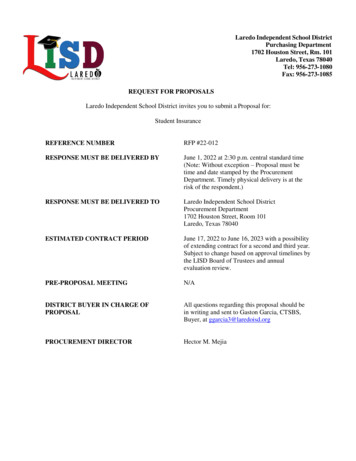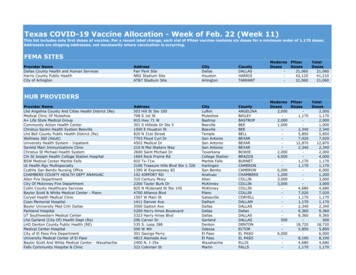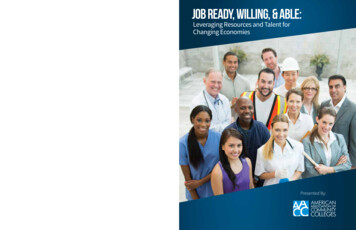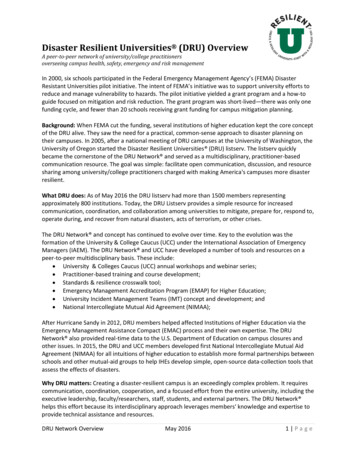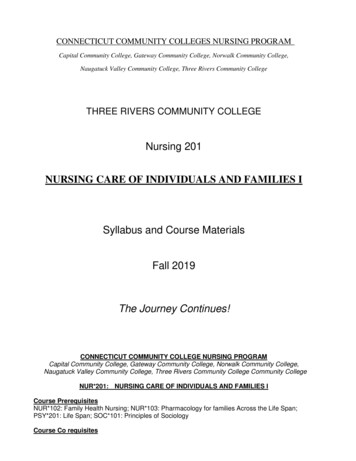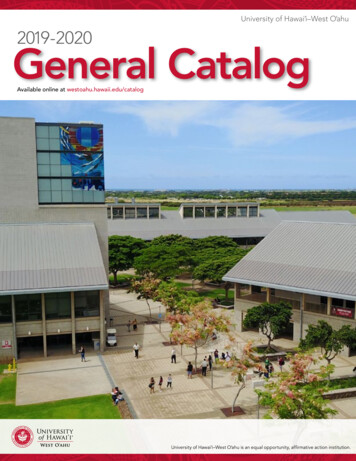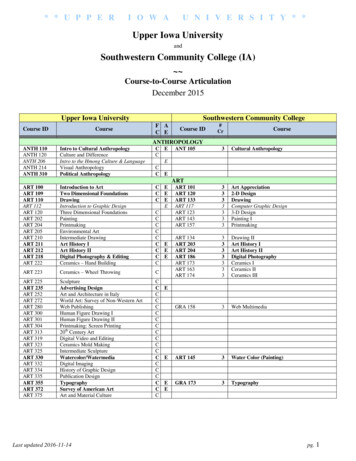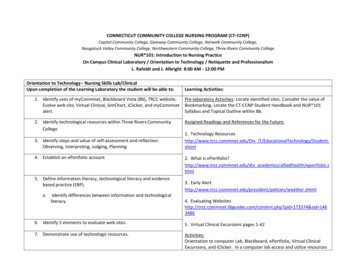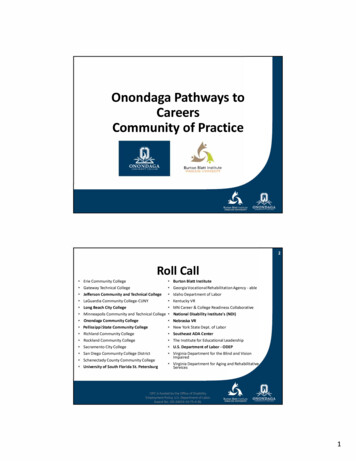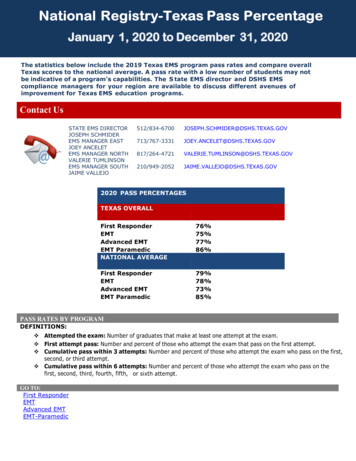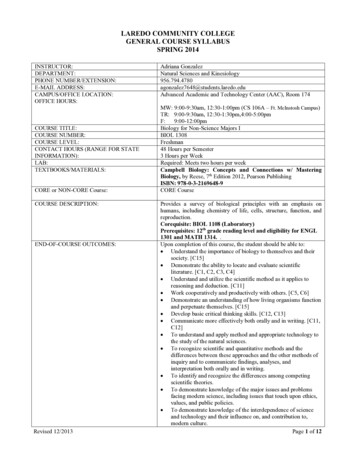
Transcription
LAREDO COMMUNITY COLLEGEGENERAL COURSE SYLLABUSSPRING 2014INSTRUCTOR:DEPARTMENT:PHONE NUMBER/EXTENSION:E-MAIL ADDRESS:CAMPUS/OFFICE LOCATION:OFFICE HOURS:COURSE TITLE:COURSE NUMBER:COURSE LEVEL:CONTACT HOURS (RANGE FOR STATEINFORMATION):LAB:TEXTBOOKS/MATERIALS:CORE or NON-CORE Course:COURSE DESCRIPTION:END-OF-COURSE OUTCOMES:Revised 12/2013Adriana GonzalezNatural Sciences and do.eduAdvanced Academic and Technology Center (AAC), Room 174MW: 9:00-9:30am, 12:30-1:00pm (CS 106A – Ft. McInstosh Campus)TR: 9:00-9:30am, 12:30-1:30pm,4:00-5:00pmF:9:00-12:00pmBiology for Non-Science Majors IBIOL 1308Freshman48 Hours per Semester3 Hours per WeekRequired: Meets two hours per weekCampbell Biology: Concepts and Connections w/ MasteringBiology, by Reese, 7th Edition 2012, Pearson PublishingISBN: 978-0-3-2169648-9CORE CourseProvides a survey of biological principles with an emphasis onhumans, including chemistry of life, cells, structure, function, andreproduction.Corequisite: BIOL 1108 (Laboratory)Prerequisites: 12th grade reading level and eligibility for ENGL1301 and MATH 1314. .Upon completion of this course, the student should be able to: Understand the importance of biology to themselves and theirsociety. [C15] Demonstrate the ability to locate and evaluate scientificliterature. [C1, C2, C3, C4] Understand and utilize the scientific method as it applies toreasoning and deduction. [C11] Work cooperatively and productively with others. [C5, C6] Demonstrate an understanding of how living organisms functionand perpetuate themselves. [C15] Develop basic critical thinking skills. [C12, C13] Communicate more effectively both orally and in writing. [C11,C12] To understand and apply method and appropriate technology tothe study of the natural sciences. To recognize scientific and quantitative methods and thedifferences between these approaches and the other methods ofinquiry and to communicate findings, analyses, andinterpretation both orally and in writing. To identify and recognize the differences among competingscientific theories. To demonstrate knowledge of the major issues and problemsfacing modern science, including issues that touch upon ethics,values, and public policies. To demonstrate knowledge of the interdependence of scienceand technology and their influence on, and contribution to,modern culture.Page 1 of 12
COURSE OBJECTIVES OR EXEMPLARYOBJECTIVES:GENERAL EDUCATION COMPETENCIES:Distinguish between prokaryotic, eukaryotic, plant and animalcells, and identify major cell structures.Identify stages of the cell cycle, mitosis (plant and animal), andmeiosis.Interpret results from cell physiology experiments involvingmovement across membranes, enzymes, photosynthesis, andcellular respiration.Apply genetic principles to predict the outcome of geneticcrosses and statistically analyze results.Describe karyotyping, pedigrees, and biotechnology and providean example of the uses of each.Identify parts of a DNA molecule, and describe replication,transcription, and translation.Analyze evidence for evolution and natural selection. To understand and apply method and appropriate technologyto the study of the natural sciences. To recognize scientific and quantitative methods and thedifferences between these approaches and the other methodsof inquiry and to communicate findings, analyses, andinterpretation both orally and in writing. To identify and recognize the differences among competingscientific theories. To demonstrate knowledge of the major issues and problemsfacing modern science, including issues that touch uponethics, values, and public policies. To demonstrate knowledge of the interdependence of scienceand technology and their influence on, and contribution to,modern culture.visual To include effective written, oral and/orcommunication. To demonstrate creative thinking, innovation, inquiry,analysis, evaluation, and synthesis of information. To include the manipulation and analysis of numerical dataor observable facts resulting in informed conclusions. To demonstrate the ability to consider different points ofview and to work effectively with others to support a sharedpurpose or goal.The General Education Competencies (SACS) and the CoreObjectives (THECB) are implemented and assessed throughout theLCC Core Curriculum. The academic and workforce areas apply thegeneral education competencies and core objectives relevant to theirprograms.Laredo Community College has identified four college-level generaleducation competencies. They are:1. Communication: LCC students develop and express ideasthrough effective written, oral, and visual communication forvarious academic and professional contexts.Expected Outcomes:A. The student uses relevant content that conveys understanding.B. The student uses disciplinary conventions for organizingcontent and presenting content.Revised 12/2013Page 2 of 12
C. The student uses communication tools appropriately andskillfully for academic and professional contexts.2. Critical Thinking: LCC students use inquiry and analysis,evaluation and synthesis of information, and innovation andcreative thinking.Expected Outcomes:A. Students pose vital questions and identify problems,formulating them clearly and precisely.B. Students consider alternative viewpoints, recognize and assessassumptions, and identify possible consequences.C. Students develop well-reasoned conclusions and solutions.D. Students apply creative ideas or approaches to achievesolutions or complete projects.3. Empirical and Quantitative Skills:LCC students applyscientific and mathematical concepts to analyze and solveproblems to investigate hypotheses.Expected Outcomes:A. Students identify problems or hypotheses and relatedquantitative components.B. Students select appropriate quantitative approaches to analyzeand solve problems and investigate hypotheses.C. Students correctly apply quantitative approaches to analyze andsolve problems and investigate hypotheses.D. Students summarize and reflect on their learning experiences.4. Teamwork: LCC students consider different points of view andwork effectively with others to support a shared purpose or goal.Expected Outcomes:A. The student makes a quality contribution to the Team Activity.B. The student treats fellow team members courteously withrespect.C. The student models personal attributes that contributeteamwork.QUALITY ENHANCEMENT PLAN (QEP)Reading: Gateway to LearningSCANS COMPETENCIES:SCANS ASSESSMENT:TEACHING STRATEGIES/METHODS OFINSTRUCTION:OUTCOMES ASSESSMENT:EXTERNAL ASSESSMENTS:Revised 12/2013The QEP is a long-term institutional commitment designed toimprove student learning. The improvement of reading and readingcomprehension was selected by the students, faculty, staff, andadministration of LCC as the focus of our QEP. The diverse readingmaterials assigned in this course should help you to improve yourbasic reading and reading comprehension skills necessary to succeedin college.Refer to attachment.TBALecture demonstrations, interactive lectures, and computer-basedinstruction. Class assignments may require your participation inactivities outside of the classroom. These activities may expose youto environmental hazards. Specific written safety instructions will beprovided when such activities are conductedUnit exams, quizzes, written assignments, and comprehensive finalexam.Students enrolled in this course may be randomly selected toparticipate in external assessments to determine educational gains.You may be asked to provide assignments which may be included incourse portfolios and used for evaluation of General EducationCompetencies. In addition, you may be selected to participate in thecompletion of surveys and/or be selected to take tests which willgauge your overall improvement in reading, writing, criticalPage 3 of 12
METHODS AND CRITERIA FOREVALUATION:GRADING SCALE:thinking, and mathematics. These activities are designed tocollectively monitor your overall progress as a higher educationstudent.Grade to be determined by:All Exams(including Final)60%Other Student Work40%.A . . Excellent, 100-90%B . Good, 89-80%C . Average, 79-70%D . Poor, 69-60%F Fail, 59% or belowF . Failure, Non-ParticipatoryI . IncompleteW . WithdrawalNC . No CreditNC . No Credit, Non-ParticipatoryNC DV . No Credit, DevelopmentalNCDV No Credit, Developmental, Non-ParticipatoryP . PassNP . No PassAU . AuditStudents must access the Semester Progress Report and Final Gradesthrough PASPort (http://pasport.laredo.edu).ATTENDANCE REGULATIONS:Office of the Registrar Fort McIntosh Campus - Memorial Hall Room103 or call (956) 721-5887 South Campus – Billy Hall Student CenterRoom 113 or call (956) 794-4109Enrollment and Registration Services Center Fort McIntosh Campus - Memorial Hall Room125 or call (956) 721-5109 or 5421 South Campus – Billy Hall Student CenterRoom 113 or call (956) 794-4109Financial Aid Center Fort McIntosh Campus – Building P-24 or call(956) 721-5361. South Campus – Billy Hall Student CenterRoom 123 or call (956) 794-4361.Health Services Center Fort McIntosh Campus – Kazen College CenterRoom 132 or call (956) 721-5189. South Campus – Billy Hall Student CenterRoom 208 or call (956) 794-4189.Instructors will notify students of the window of availability forgrades.Attendance will be taken up until the official census date, which isthe first 11 class days during the fall and spring semester, and for thefirst three days during the summer sessions. Students who attend atleast one day of class leading up to the census date will be officiallyenrolled in the course, and faculty members will drop any studentswho have not attended at least one class day. Once the officialcensus date for the semester or session has passed, no formalattendance will be required except for programs where the respectiveaccreditation agency requires attendance records.Students who do not intend to remain enrolled after attending at leastone class day must initiate a drop request from any or all classes bysubmitting a drop slip to the Enrollment and Registration ServicesCenter or through PASPort. Responsibility for class attendancerests with the student. Regular and punctual attendance isexpected.It is advised that a student contact Financial Aid Center at eithercampus prior to dropping a course.Absence From Final Examinations:A student who is absent from a final examination receives a grade of"0" for the examination and a grade of "F" for the course. Anystudents authorized to be absent from a final examination receive agrade of “I” on their transcript until they take the final examination.Such students must take the final exam within four months. Finalexams cannot be re-taken. The instructor will submit a GradeChange Form to change the previously submitted incomplete gradeto an “F” if the student does not meet the 4 month deadline.Other Policies (LCC and State-Wide):Revised 12/2013Page 4 of 12
A. 3-peat—If a student signs up for a class for a third time, even ifhe/she dropped or failed it before, the State will not providefunding for that student and the student will be required to payan additional fee.B. 6 W’s—Beginning Fall 2007, students cannot drop more than 6classes throughout their college career. Any subsequent dropswill become F’s. The rule includes credits earned at all Texascolleges/universities, and W’s will carry over when transferringto other institutions.C. Finishing on time—The State expects students to graduate ontime. Students who obtain 90 or more credit hours at aCommunity College are no longer eligible for financial aid.D. Bacterial Meningitis Vaccination Requirement effectiveSpring 2012; update effective October 1, 2013. Per Texas State Law (SB 62), students who meet the criteriabelow must provide proper documentation that they havereceived the bacterial meningitis vaccination within the lastfive years and at least 10 calendar days before the beginningof the semester. All new or transfer students under age 22. All returning students under the age of 22, who haveexperienced a break in enrollment of at least one fall or springterm. Students enrolled in online courses that physically attendclasses or come to campus within the semester.SPECIAL SERVICES CENTER: Fort McIntosh Campus - Building P-41 South Campus – Billy Hall Student Center,Room 21Fort McIntosh and South CampusPhone Number: (956) 721-5137Vaccination records must be submitted to LCC’s Campus Nurse atthe Health Services Center.A student with disabilities, including learning disabilities, whowishes to request special accommodations in this class, should notifythe Special Services Center. The request should be made early in thesemester so that appropriate arrangements may be made. Inaccordance with Federal Law, a student requesting accommodationsmust provide documentation of his/her disability to the SpecialServices Counselor. For additional information, call or visit theSpecial Services Center.The student who needs note-taking and/or test-takingaccommodations must notify the faculty member prior to the firstexam.A pregnant student is required to meet all course/ program outcomes,including attendance.GRADE APPEAL:Revised 12/2013There may be contaminants present in clinical area(s) that couldadversely affect a fetus. It is advisable for the student to contact herobstetrician, once pregnancy has been confirmed, to ensure that thereare no medical concerns/limitations to continuing her courses.A student who wishes to question the final grade earned in a courseor class activity should first discuss the situation with the instructorwho issued the grade. If the issue is not resolved, the student shouldcontact the appropriate Department Chairperson to request a reviewof the grade.If the student is not satisfied with the Department Chairperson’sdecision, the student may contact the appropriate Dean of Instructionfor assistance related to the grade appeal. Established departmentalprocedures will be utilized to resolve student grade appeals. Afterall other avenues have been exhausted; the student may request aPage 5 of 12
review of the grade by the Vice-President for Instruction. Studentgrades are an academic matter; therefore, there is no further appealbeyond the Office of the Vice-President for Instruction.CLASSROOM ETIQUETTE:Office of Dean of Student Affairs Fort McIntosh Campus – Memorial Hall Room212 Phone Number: (956) 721-5417Students have two weeks (10 working days) after a final coursegrade is issued to appeal it. Students have one week (five workingdays) after an activity grade is issued to appeal it. Exceptionsrequire the approval of the Vice-President for Instruction.Code of Student Conduct & DisciplineEach student is expected to be fully acquainted with all publishedpolicies, rules, and regulations of the College, copies of which shallbe available to each student for review at LCC’s website atwww.laredo.edu (Student Life/Student Handbook/Student Rightsand Responsibilities) and the Office of the Dean of Student Affairs.Laredo Community College will hold each student responsible forcompliance with these policies, rules, and regulations. The studentis responsible for obtaining published materials to update the itemsin this Code. Students are also expected to comply with all federal,state, and local laws. This principle extends to conduct off campuswhich is likely to have an adverse effect on Laredo CommunityCollege or on the educational process.Student MisconductEach student is expected to conduct him/herself in a mannerconsistent with the college's functions as an educational institution.Specific examples of misconduct and the disciplinary process arelocated at LCC’s website at www.laredo.edu (Student Life/StudentHandbook/Student Rights and Responsibilities).Use of Personal Electronic DevicesThe use of an electronic device shall not interfere with theinstructional, administrative, student activities, public service, andother authorized activities on College District premises. Unless priorauthorization is obtained from the instructor or respective CollegeDistrict official, the use of an electronic device is expresslyprohibited in classrooms, laboratories, clinical settings, anddesignated quiet areas on College District premises. Certainviolations of this policy may be excused in the case of emergenciesor other extenuating circumstances provided that prior approval isobtained from the instructor or respective College District official.The use of electronic equipment capable of capturing still or movingimages in any location where individuals may reasonably expect aright to privacy is not authorized on College District premises.Noncompliance with these provisions shall be considered a violationof Board adopted policy and shall warrant appropriate disciplinaryaction.Academic DishonestyThe College expects all students to engage in all academic pursuitsin a manner that is beyond reproach. Students will be expected tomaintain complete honesty and integrity in their experiences in theclassroom. Any student found guilty of dishonesty in their academicwork is subject to disciplinary action.(1) The College and its official representatives may initiatedisciplinary proceedings against a student accused of any formRevised 12/2013Page 6 of 12
of academic dishonesty including, but not limited to, thefollowing:A. Scholastic dishonesty includes, but is not limited to,cheating on academic work, plagiarism, and collusion.B. Cheating on academic work includes:a. Copying from another student's test paper or otheracademic work.b. Using, during a test, materials not authorized by theperson giving the test.c. Collaborating, without authority, with another studentduring an examination or in preparing academic work.d. Knowingly using, buying, selling, stealing, transporting,or soliciting, in whole or part, the contents of anunadministered test.e. Substitution for another student, or permitting anotherstudent to substitute for oneself, to take a test or prepareother academic work.f. Bribing another person to obtain an unadministered testor information about an unadministered test.C. Plagiarism means the appropriation of another's work andthe unacknowledged incorporation of that work in one'sown written work offered for credit.D. Collusion means the unauthorized collaboration withanother person in preparing written work offered for credit.(2) Procedures for discipline due to academic dishonesty shall be thesame as in student disciplinary actions, except that all academicdishonesty actions shall be first considered and reviewed by thefaculty member. If the student does not accept the decision ofthe faculty member, he/she may appeal the decision to theappropriate Department Chairperson, Dean of Instruction, or theVice President for Instruction. If the student does not accept thedecision of the appropriate Department Chairperson, Dean ofInstruction, or the Vice President for Instruction, the studentmay then follow the normal disciplinary appeal procedures for areview of the decision.For additional information please refer to the:Student Policies - LCC Policy ManualThe LCC Policy Manual is available online and includes all Federal,State, and Local Policies applicable to the College. Students mayaccess the LCC Policy Manual through LCC’s website atwww.laredo.edu (About LCC/Manual of Policy).EMERGENCY PROCEDURES:IN CASE OF EMERGENCY,LCC Alert System: Safety and security for LCC is paramount.When an emergency arises, LCC will provide students withinformation as rapidly and as efficiently as possible. Students mustregister for the LCC Alert system at www.laredo.edu/lccalert.From an LCC phone, dial 111.From a Cell phone, dial 911.Emergencies: In case of an emergency, contact Campus Police.Campus Police will then dispatch a police officer to the site and alertemergency personnel. If it is determined that a notification needs tobe sent out after an emergency is reported, the notification willprovide information on what to do.LCC Campus Police OfficesRevised 12/2013Page 7 of 12
Fort McIntosh Campus – Building P-64 Room102 South Campus – Henry Cuellar ProtectiveServices Center Room 130DISCLAIMER:When a person calls 111 or 911, Campus Police strongly encouragesthe caller to provide the following information: name, the locationfrom where they are calling, the location of the emergency, and thetype of emergency. The caller is to remain on the phone with thedispatcher until emergency responders arrive.Every attempt has been made to make the contents of this syllabusinformative and accurate. Content of the syllabus is subject torevision and change in the event of extenuating circumstances.Changes will be made available to you electronically.The updated official version of the LCC Catalog is the on-line catalog and can be found at www.laredo.edu(Admission/College Catalog).ADDITIONAL COURSE INFORMATIONLate work is NOT accepted! Failure to turn in anassignment on time will result in an absence and a gradeof zero.Students must supply Scantron answer sheets and No. 2pencils w/ erasers for exams (as required).A short quiz may be administered at the Beginning ofeach lecture or lab session.Revised 12/2013All Assignments are due at the beginning of the class asassignedStudents may not leave the room for any reason beforefinishing an exam.All RAs or any other written work are due electronicallythrough www.turnitin.comPage 8 of 12
Laredo Community CollegeCourse CalendarBIOL 1308 – Biology for Non-Science Majors ISPRING 2014 – Adriana GonzalezDate WeekBrief Description of Topic1Biology: Exploring Life234The Chemical Basis of LifeThe Molecules of CellsA tour of the Cell567The Working CellHow Cells Harvest Chemical EnergyPhotosynthesis: Using Light to MakeFoodThe Cellular Basis of Reproduction andInheritanceSpring breakPatterns of InheritanceMolecular Biology of the GeneSystematics & ProkaryotesProtista & FungiPlantsThe Evolution of Invertebrate DiversityThe Evolution of Vertebrate Diversity8Spring break910111213141516Assignments/Examinations/ Activitieswith Brief DescriptionFirst day Handouts/Pre-test @ Tutoring/e-mail Quiz due by 1/16/14Research Topic due (1/23/14)Library assignment sheet due (1/30/14)Exam I (Chapters 1-3)Reference Analysis (RA) #1dueCell theory HomeworkRA #2 dueRA #3dueExam II (Chapters 4-7)RA #4dueSpring breakResearch outline dueAll Research papers dueExam III (Chapters 8-10)Plant/Fungi homeworkExam IV (Chapters 15-17)Insect collection/ Post-testChapters/Reading MaterialsText book(TB) Ch. 1TB Ch. 2TB Ch. 3TB Ch. 4TB Ch. 5TB Ch. 6TB Ch. 7TB Ch. 8Spring breakTB Ch. 9TB Ch. 10-12TB Ch. 15.15, 16TB Ch. 16, 17TB Ch. 17TB Ch. 18TB Ch. 18, 19Comprehensive FINAL EXAM (Ch. 1-19)* Schedule is subject to change.Revised 5/2013Page 9 of 12
SCANS COMPETENCIESENCLOSUREThe Secretary’s Commission on Achieving Necessary Skills (SCANS) has identified foundation skills and workplacecompetencies for students. Foundation Skills are defined in three areas: basic skills, thinking skills, and personal qualities.Basic Skills includes Reading, Writing, Arithmetic and Mathematical Operations, Listening, and Speaking effectively.Thinking Skills include a worker must think creatively, make decisions, solve problems, visualize, know how to learn, andreason effectively. Personal Qualities include a worker must display responsibility, self-esteem, sociability, selfmanagement, integrity, and honest. Work Place Competencies include resources, interpersonal skills, information, systems,and technology.Foundation SkillsBasic Skills: Reads, writes, performs arithmetic and mathematical operations, listens and speaks.F1. Reading: Locates, understands, and interprets written information in prose and in documents such as manuals,graphs, and schedules.F2. Writing: Communicates thoughts, ideas, information, and messages in writing; and creates documents such asletters, directions, manuals, reports, graphs, and flowcharts.F3. Arithmetic: Performs basic computations and approaches practical problems by choosing appropriately from avariety of mathematical techniques.F4. Listening: Receives, attends to, interprets, and responds to verbal messages and other cues.F5. Speaking: Organizes ideas and communicates orally.Thinking Skills: Thinks creatively, makes decisions, solves problems, visualizes, knows how to learn, and reasons.F6. Creative Thinking: Generates new ideas.F7. Decision Making: Specific goals and constraints, generates alternatives, considers risks, and evaluates andchooses best alternative.F8. Problem Solving: Recognizes problems and devises and implements plan of action.F9. Seeing Things in the Mind’s Eye: Organizes and processes symbols, pictures, graphs, objects, and otherinformation.F10. Knowing How To Learn: Uses efficient learning techniques to acquire and apply new knowledge and skills.F11. Reasoning: Discovers a rule or principle underlying the relationship between two or more objects and applies itwhen solving a problem.Personal Qualities: Displays responsibility, self-esteem, sociability, self-management, integrity, and honesty.F12.F13.F14.F15.F16.Responsibility: Exerts a high level of effort and perseveres toward goal attainment.Self-Esteem: Believes in own self-worth and maintains a positive view of self.Sociability: Demonstrates understanding, friendliness, adaptability, empathy, and politeness in group settings.Self-Management: Assesses self accurately; sets personal goals, monitors progress, and exhibits self-control.Integrity/Honesty: Chooses ethical course of action.Workplace CompetenciesResourcesC1. Allocates Time: Selects relevant, goal-related activities, ranks them in order of importance, allocates time toactivities, and understands, prepares, and follows schedules.C2. Allocates Money: Uses or prepares budgets, including making cost and revenue forecasts, keeps detailed recordsto track budget performance, and makes appropriate adjustments.C3. Allocates Material and Facility Resources: Acquires, stores, and distributes materials, supplies, parts,equipment, space, or final products in order to make the best use of them.C4. Allocates Human Resources: Assesses knowledge and skills and distributes work accordingly, evaluatesperformance, and provides feedback.InterpersonalC5. Participates as a member of a team: Works cooperatively with others and contributes to group with ideas,suggestions, and effort.C6. Teach Others New Skills: Helps others to learn.C7. Serves Clients/Customers: Works and communicates with clients and customers to satisfy their expectations.Revised 5/2013Page 10 of 12
C8. Exercises Leadership: Communicates thoughts, feelings, and ideas to justify a position, encourages, persuades,convinces, or otherwise motivates an individual or groups: including responsibly challenging existing procedures,policies, or authority.C9. Negotiates to Arrive at a Decision: Works toward an agreement that may involve exchanging specific resourcesor resolving divergent interests.C10. Works with Cultural Diversity: Works well with men and women and with a variety of ethnic, social, oreducational backgrounds.InformationC11. Acquires and Evaluates Information: Identifies need for data, obtains it from existing sources or creates it, andevaluates its relevance and accuracy.C12. Organizes and Maintains Information: Organizes, processes, and maintains written or computerized reportsand other forms of information in a systematic fashion.C13. Interprets and Communicates Information: Selects and analyzes information and communicates the results toothers using oral, written, graphic, pictorial, or multi-media methods.C14. Uses Computers to Process Information: Employs computers to acquire, organize, analyze, and communicateinformation.SystemsC15. Understands Systems: Knows how social, organizational, and technological systems work and operateseffectively within them.C16. Monitors and Corrects Performance: Distinguishes trends, predicts impact of actions on system operations,diagnoses deviations in the function of a system/organization, and takes necessary action to correct performance.C17. Improves and Designs Systems: Makes suggestions to modify existing systems to improve products or services,and develops new or alternative systems.TechnologyC18. Selects Technology: Judges which set of procedures, tools, or machines, including computers and their programswill produce the desired results.C19. Applies Technology to Task: Understands the overall intent and the proper procedures for setting up andoperating machines, including computers and their programming systems.C20. Maintains and Troubleshoots Technology: Prevents, identifies, or solves problems in machines, computers,and other technologies.Revised 5/2013Page 11 of 12
LAREDO COMMUNITY COLLEGECOURSE SYLLABUSSTUDENT ACKNOWLEDGEMENT FORMI have read and understood the information and requirements of the course syllabus for, .Course & NumberSemesterStudent Name (Please Print)Palomino IDDateAdmission into and/or graduation from a program does not guarantee employment, a particular salary level,and/or passage on any licensure examinations.Student SignatureFaculty Name(Please Print)Revised 5/2013Page 12 of 12
Laredo Community College has identified four college-level general education competencies. They are: 1. Communication: LCC students develop and express ideas through effective written, oral, and visual communication for various academic and professional contexts. Expected Outcomes: A. The student uses relevant content that conveys understanding. B.
